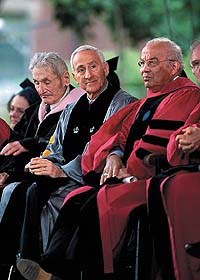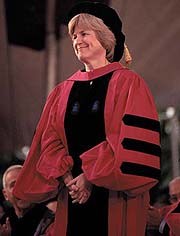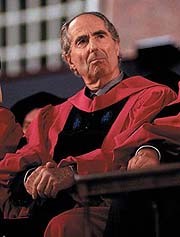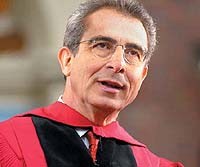Donald E. Knuth. A founding father of computer science. His work on algorithms and literate programming laid essential foundations for modern computing; his work on digital typography has been hailed as one of the great advances in publishing since the invention of the printing press. He is professor emeritus of the art of computer programming at Stanford. Doctor of science: Font of digital ingenuity, icon of algorithmic invention, whose artful efforts have programmed the course of a powerful modern science.
Linda Nochlin. One of the foremost living scholars of art, she is known for her formative influence on the understanding of nineteenth-century European art and culture and for her feminist perspective on the history of art. The Wallace professor of modern art at New York University, she will be at Harvard in the coming academic year as the Charles Eliot Norton professor. Doctor of letters: Fierce in her independence, eloquent in her iconoclasm, a transformational scholar who engenders fresh perspectives on the history of art.
 |
| From left: Forbes, Vagelos, Francis |
| Photograph by Jim Harrison |
Gary Becker. Nobel laureate Becker is a University Professor in the departments of both economics and sociology at the University of Chicago. He focuses what he calls the economic way of looking at life on social issues beyond the traditional scope of economics, ranging from discrimination against minorities to marriage and family life. Doctor of laws: Transcending the traditions of his discipline, seeing social behavior through an acute new lens, he shows how economics helps us make the most of life.
Elliot Forbes '41, A.M. '47. "If music be the food of love," said Provost Hyman, "our next guest has kept the Harvard community well-fed and well-loved for decades." Forbes is the Peabody professor of music emeritus and former director of the Harvard Glee Club and the Radcliffe Choral Society. (He got a standing ovation from the Commencement Choir.) Doctor of music: Magnetic maestro of sonorous choirs, Beethoven scholar extraordinaire, a buoyant man of music lifting voices and spirits on the wings of song.
P. Roy Vagelos. After service as chair of biological chemistry at Washington University in St. Louis, Vagelos launched a two-decade career at Merck, rising to become CEO and chairman. He made the drug Mectizan available, free of charge, to millions of Africans at risk for the disease called river blindness. Doctor of laws: Superior scientist and enterprising executive, farsighted philanthropist and friend of education, a worldwide leader in striving for better human health.
Norman Francis. President for 35 years of Xavier University in New Orleans, one of the finest of America's historically black colleges and universities, he is past president of the United Negro College Fund and the American Association of Higher Education. He is former chair of the Carnegie Foundation for the Advancement of Teaching, the Educational Testing Service, and the College Entrance Examination Board. Doctor of laws: An exemplary exponent of the value and virtue of learning, preparing countless minds to see the outstretched hand of opportunity.
Ellsworth Kelly. A paramount figure in American abstract art, many of whose works inhabit a zone between painting and sculpture. One critic writes that his style is known for its "paradoxical coincidence of austerity and sensuality, clarity and evocativeness, flatness and spatial ambivalence." Doctor of arts: An avatar of abstraction whose compositions reveal the splendid elegance of elemental forms; his art evokes the essential.
 |
| King |
| Photograph by Jim Harrison |
Mary-Claire King. A geneticist and epidemiologist at the University of Washington, she was the first to show that breast cancer is inherited in some families. In the 1980s, after a period of political kidnapping in Argentina, she deployed a genetic test to help reunite abducted children with their families. Recently, her lab has served as the DNA identification base for the United Nations war-crimes tribunal. Doctor of science: With boldness, rigor, and compassion, she has propelled progress in discerning the genetics of disease, while decoding chromosomal clues in quest of justice.
 |
| Roth |
| Photograph by Jim Harrison |
Philip Roth. The author of more than 20 novels and short-story collections, from Goodbye, Columbus and Portnoy's Complaint to American Pastoral and The Human Stain. Doctor of letters: A daringly provocative American original, whose searing sense of humor and stirring sense of tragedy attest to the proverb, "Troubles overcome are good to tell."
Robert G. Stone Jr. '45 ('47). In 1947 Stone captained the Harvard heavyweight crew that set a world record for the 2,000 meters. Last year he concluded 27 years on the Harvard Corporation, the last seven as its Senior Fellow. He remains the chair of the Committee on University Resources. Doctor of humane letters: Wise and spirited Crimson captain, ever steady amid changing currents, whose skillful steerage at the laboring oar has kept Harvard riding on rising tides.
 |
| Zedillo |
| Photograph by Jim Harrison |
Ernesto Zedillo Ponce de León. As president, he guided Mexico through the financial turmoil of the mid 1990s and undertook reforms that opened the way for greater political pluralism in a nation long dominated by a single party. He now directs Yale's Center for the Study of Globalization. Doctor of laws: Resolute champion of democracy and prosperity, who launched a new era for his nation; astute analyst of global affairs, urging conscientious and disciplined concern for the developing world.
N.B. The doctor of letters degree is given to writers, the doctor of humane letters degree to humanitarians. Other honorands are awarded the doctor of laws degree, unless they are scientists or artists.





